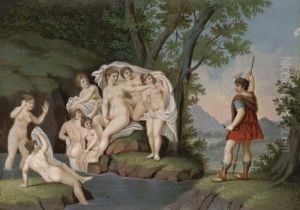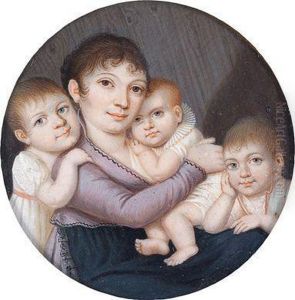Josef Einsle Paintings
Josef Einsle was a German painter known for his detailed portraits and miniatures. Born on November 17, 1801, in Augsburg, Bavaria, he developed an interest in art at an early age. Einsle received his initial artistic training at the Academy of Fine Arts Munich, which was a significant center for art and culture in Germany at the time.
In the early stages of his career, Einsle was influenced by the Biedermeier period, which is reflected in the intimate and detailed characteristics of his work. The Biedermeier era was marked by a sense of simplicity and a focus on the domestic and everyday life, which is evident in Einsle's approach to portraiture. He became particularly renowned for his miniature portraits, a genre that was highly popular among the middle and upper classes during the 19th century. These miniatures were often used as personal mementos or gifts, and Einsle's skill in capturing the likeness and character of his subjects made him a sought-after artist.
Throughout his career, Josef Einsle remained active in the art community, participating in exhibitions and taking on commissions. His works were appreciated for their precision and attention to detail, often employing a fine brush to capture the nuances of the sitter's features and attire. Despite the rise of photography during his lifetime, which eventually led to a decline in the demand for portrait miniatures, Einsle's work continued to be valued for its artistic quality and craftsmanship.
Einsle's legacy as a portraitist and miniaturist remains significant, as his works provide a window into the styles and sensibilities of the 19th-century German bourgeoisie. His portraits are not only appreciated for their artistic merit but also for their historical value, offering insights into the fashion, culture, and individuals of his time. Josef Einsle passed away on March 19, 1871, in Munich, leaving behind a body of work that continues to be studied and admired for its contribution to the field of portrait miniatures.

